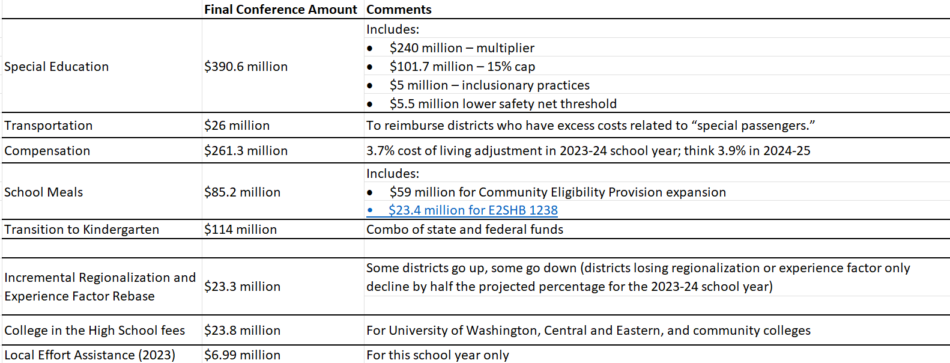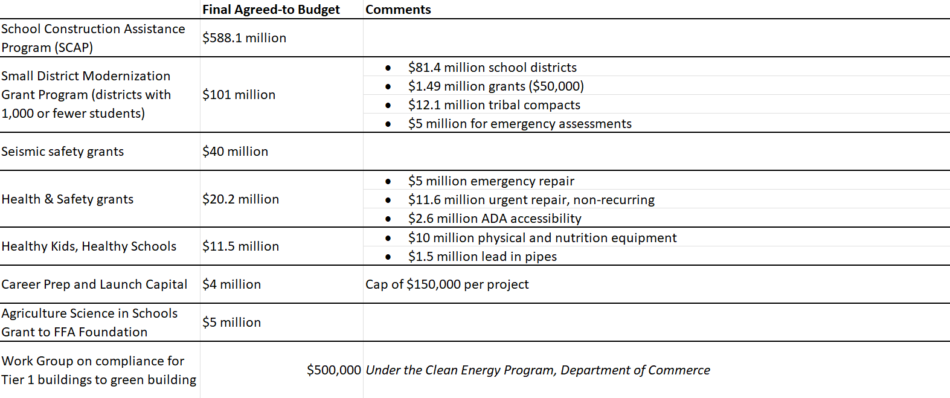Prepared by Marie Sullivan, legconsultant@wastatepta.org
April 23rd was the final day of the 105-day 2023 legislative session. The operating budget Conference Committee released the biennial budget Saturday, April 22nd. The Senate and House are expected to approve the budget bills before adjourning sine die[1].
Here’s a quick overview of ESSB 5187, related to the bigger K-12 education funding items in the 2023-25 final operating budget (amounts subject to slight changes, based on final reporting):
[1] Sine die means: without any future date being designated, i.e.., the meeting adjourned sine die.Narrative behind the budget numbers
Special education
On April 22nd, the House concurred with the Senate changes to ESHB 1436 and the budget reflects the estimated fiscal impact, including lifting the cap on enrollment to 15%. The multiplier rate increases to:
The bill also has two clauses meant to make it easier for districts to access the safety net for high-cost students. Beginning in the 2023-24 school year, a high-need student is eligible for safety net awards if the student’s IEP costs exceed:
- 2 times the average per-pupil expenditure for school districts with fewer than 1,000 full-time equivalent students;
- or 2.2 times the average per-pupil expenditure for school districts with 1,000 or more full-time equivalent students.
Transportation – Excess costs for special passengers
E2SSB 5174 would have created in statute a safety net transportation grant program to reimburse school districts for demonstrated excess costs for special passengers, defined as students with disabilities, students experiencing homelessness, and students in the foster care system. The bill didn’t survive the session, but the legislature included $26 million in the 2023-25 operating budget.
Regionalization, Experience Factor, LEA
In the end, the Legislature adopted a budget that rebased regionalization and experience factor (see LEAP document 3). For districts losing regionalization or experience factor, the hit to 2023-24 was a softer landing of half of the anticipated loss. For example, for districts losing 6% regionalization, the loss will only be 3% next school year, but they will lose all regionalization in the 2024-25 school year. For districts losing the 4% experience factor, the loss will be 2% next school year, and lose all experience factor the next school year.
Recognizing that assessed values are increasing and, therefore, local effort will be decreasing, the Legislature created a one-time cushion for 131 school districts. See LEAP document 4 for a list of districts and projected funding for the 2023 fiscal year that ends June 30, 2023.
2023-25 Capital Budget
The Legislature adopted a two-year capital budget before adjourning. Here are the highlights of ESSB 5200:
In addition to the amounts above, school districts are eligible applicants for other programs, including Climate Commitment Act funding; Early Learning Facility grants; Safe Routes to Schools; and other programs to be detailed in future reports.
Unfortunately, HB 1044, the “small school districts with demonstrated funding challenges” bill sponsored by Wahkiakum Rep. Joel McEntire, died when the Senate refused to grant a conference committee. The bill had $3.9 million in grants in the capital budget, which also will expire due to the reference to the bill.
As amended in the Senate, HB 1044 included not just the new program for small school districts but a way to permanently fund the Small District Modernization Grant program. The House refused to concur with the changes, the bill ping-ponged back and forth a few times, dying April 21st with the Senate refusal to meet in a conference committee to sort out remaining issues.
Like all bills that do not pass this session, HB 1044 can be considered next session.
Transition to Kindergarten, 2SHB 1550
At the time of this report, the fate of the new “transition to kindergarten” program was not known. The Senate had a new striking amendment, offered by Senator Claire Wilson, D-Federal Way. Among the agreed-upon issues with the House was a pause for the next two school years on charter schools being allowed to offer TK or TTK programs. The 2023-25 operating budget only included funding for school districts, charter schools authorized by a school district, and tribal-compact schools offering a TTK program. Starting in the 2025-27 school year, charter schools would be authorized to offer TTK.
Enter Senator Mark Mullet, D-Issaquah, with an amendment to give all charter schools immediate authority to offer TTK. The House has clearly said they will not concur with the Senate changes if the Mullet amendment is added to the Wilson striking amendment. This one may be a long drawn-out process, so stay tuned for the final gavel results.


